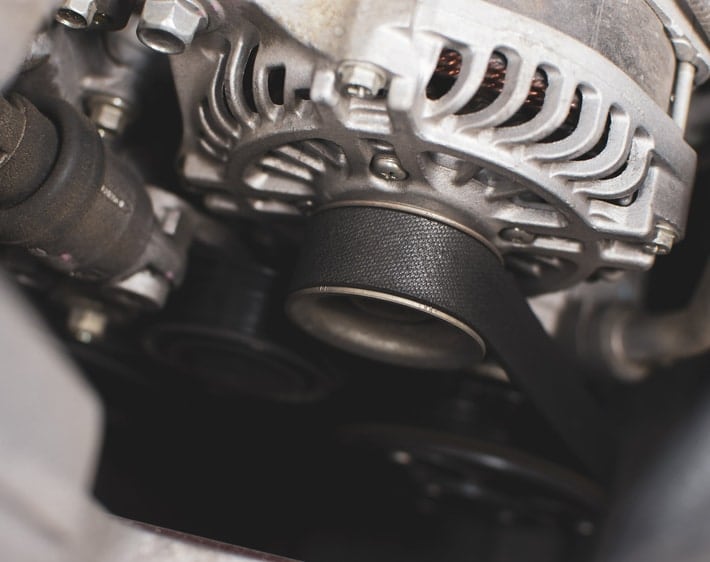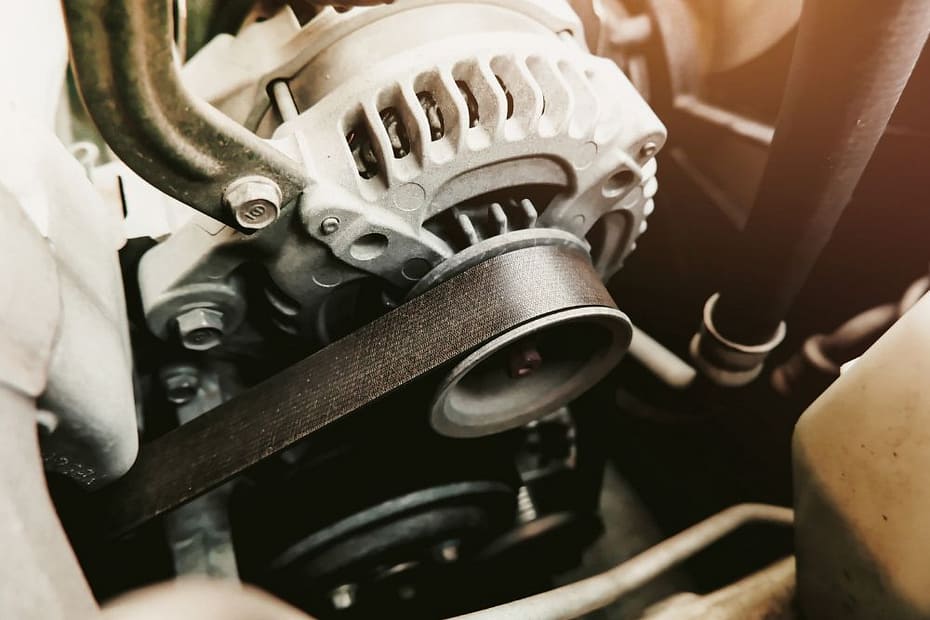An alternator is a device that converts mechanical energy from the engine into electrical energy to power the vehicle’s electrical system and recharge the battery.

Credit: www.firestonecompleteautocare.com
What Is An Alternator?
An alternator is an essential component of a vehicle’s charging system. It is responsible for converting mechanical energy into electrical energy, ensuring that the battery remains charged and the electrical components function properly. Unlike a generator that relies on a commutator and brushes, an alternator produces alternating current (AC) power using a rotating magnetic field.
Function
An alternator serves two main functions in a vehicle:
- Generating electrical power: The primary function of an alternator is to generate electrical power to charge the vehicle’s battery and supply power to the electrical systems. When the engine is running, the alternator produces AC power that is converted into DC power through the use of diodes.
- Replacing electrical power: The alternator also replaces the electrical power used by the vehicle’s electrical systems and accessories. It ensures that the battery stays charged and provides a continuous supply of power for all electrical functions, such as lights, audio systems, and ignition.
Components
An alternator consists of several key components, including:
- Rotor: The rotor is the rotating part of the alternator that contains the field winding. It creates a strong magnetic field when supplied with electrical power through the brushes and slip rings.
- Stator: The stator is a stationary part of the alternator that surrounds the rotor. It contains wire windings that produce the necessary electrical output when exposed to the rotating magnetic field.
- Diode trio: The diode trio is responsible for converting the AC power produced by the alternator into DC power. It consists of three diodes that rectify the current, allowing it to flow in one direction.
- Regulator: The regulator controls the output voltage of the alternator and ensures that it remains within the specified range. It regulates the magnetic field strength of the rotor, adjusting the output voltage based on the battery’s requirements.
- Brushes and slip rings: The brushes and slip rings make electrical contact with the rotor, allowing current to flow to the rotor’s field winding. The brushes are typically made of carbon and provide a sliding electrical connection, while the slip rings are metallic rings on the rotor shaft.
An alternator is crucial to the proper functioning of a vehicle’s electrical systems, ensuring a continuous power supply and a charged battery. Understanding its function and components can help you diagnose and address any issues related to the charging system.
History Of The Alternator
The alternator is a vital component of modern automobiles, responsible for generating electrical energy to power the various electrical systems. It works by converting mechanical energy into electrical energy through electromagnetic induction. Understanding the history of the alternator provides insight into how this crucial device has evolved over the years.
Early Generators
In the early years of electrical power generation, generators were used to produce electricity. These generators utilized a DC (Direct Current) system, which relied on the principle of rotating magnetic fields. While effective, DC systems had their limitations, such as difficulty in regulating voltage output and the need for frequent maintenance.
To overcome these limitations, the development of AC (Alternating Current) systems took place. AC systems were found to be more efficient in long-distance power transmission and easier to regulate. The introduction of AC systems eventually led to the development of the first alternators.
Development Of Modern Alternators
The modern alternator as we know it today emerged in the early 20th century. With the advancements in electrical engineering, engineers discovered a more efficient way to generate electricity using rotating magnetic fields and electromagnetic induction. This led to the development of alternators that could produce AC power with high efficiency.
- In the 1960s, alternators began to replace generators as the primary electrical power source in automobiles.
- Alternators offered several advantages over generators, such as higher power output, increased efficiency, and better voltage regulation.
- Furthermore, alternators were smaller and lighter than generators, making them more suitable for use in vehicles.
Today, the alternator remains a crucial component of automobiles and various other electrical systems. It continues to be refined and improved upon to meet the ever-increasing power demands of modern vehicles.
Signs Of Alternator Issues
Dimming Lights
One of the telltale signs of potential alternator issues is dimming lights. If you notice your headlights or interior lights dimming or flickering, it could indicate a problem with your alternator. This is often caused by a lack of power being generated by the alternator, resulting in varying levels of electricity reaching the lighting system. Ignoring this issue can lead to further electrical problems and vehicle breakdowns.
Strange Noises
Another common indication of alternator trouble is hearing strange noises, such as squealing, grinding, or whining. These noises can be caused by a faulty belt or bearing within the alternator. When these components are worn or damaged, they can create abnormal sounds that signal a need for alternator inspection and potential replacement.

Credit: www.tirestar.net
Alternator Maintenance
Intro:The alternator is a key component of your vehicle’s electrical system. Proper maintenance is essential to ensure its optimal performance and longevity. One crucial aspect of alternator maintenance is conducting regular inspections and checks to identify and address any issues promptly.
Regular Inspections
Regular inspections are vital to catch potential problems early and prevent more significant issues down the line.
Belt Tension Checks
Checking the belt tension ensures the alternator operates efficiently and prevents slippage that can lead to power loss.
Upgrading Your Alternator
An alternator is a crucial component of your vehicle’s electrical system. When it comes to increasing power output and improving performance, upgrading your alternator can make a significant difference.
Increased Power Output
Upgrading to a high-output alternator can provide your vehicle with more power for accessories and demanding electrical loads.
High-output Alternator Options
There are various high-output alternator options available to suit different vehicle types and power needs. Some popular choices include dual rectifier designs and high-amp units.

Credit: garageguysautomotive.com
Frequently Asked Questions For Whats Alternator
What Does An Alternator Do?
The alternator converts mechanical energy from the engine into electrical energy to power the car’s electrical system and recharge the battery.
What Are The Symptoms Of A Bad Alternator?
Symptoms of a bad alternator include dimming or flickering lights, weak or dead battery, strange electrical behavior, and a burning smell. Other signs may include difficulty starting the engine, whining noises, and dashboard warning lights. It’s important to address these issues promptly to avoid potential breakdowns.
How Much Is A New Alternator?
A new alternator typically costs around $200 to $600, depending on the make and model of your vehicle. Prices may vary based on labor costs and if you purchase the part from a dealer or an aftermarket retailer.
What Happens When The Alternator Goes Out?
When the alternator goes out, the battery drains and the vehicle may stall. The electrical systems might fail, including headlights and power windows. Replace the alternator to restore the vehicle’s power supply and prevent further damage. Regular maintenance can help prevent alternator failure.
Conclusion
In understanding the importance of the alternator, it becomes clear that it plays a crucial role in the functioning of a vehicle. By generating electrical power, the alternator ensures the smooth operation of various electrical components. Regular maintenance and timely replacements are imperative to avoid breakdowns and enhance the longevity of the vehicle.
Understanding the alternator’s significance empowers vehicle owners to make informed decisions and prioritize maintenance for optimal performance.
